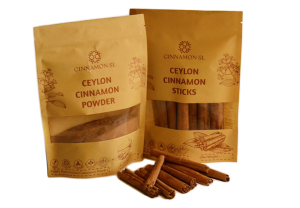
Cinnamon Apple Pie Like Never Before: Why Ceylon Cinnamon Changes Everything
Cinnamon Apple pie is a timeless dessert. It’s warm apple, golden crust, and the amazing aroma of cinnamon will surely

Cinnamon is more than just a spice that enhances your favorite dishes; it’s a powerhouse of flavor, texture, and health benefits.
But did you know that not all cinnamon is equal? There are several types of cinnamon, each with unique characteristics, uses, and health properties. This guide will help you understand the different types of cinnamon and how to choose the true cinnamon according to your need.
Cinnamon is derived from the inner bark of trees belonging to the genus Cinnamomum. Once harvested, the bark is dried under mild wind, forming cinnamon sticks or ground into powder. This ancient spice has been used for thousands of years for culinary, medicinal, and even ceremonial purposes.
Characteristics: Ceylon cinnamon, also known as “True Cinnamon,” comes from the Cinnamomum Zeylanicum tree, only grown in Sri Lanka. It has thin and delicate bark that forms multiple layers when rolled.
Taste Profile: Ceylon cinnamon offers a mild, sweet flavor with subtle citrus notes, making it ideal for any hot or cold beverage, desserts and delicate dishes.
Health Benefits: Known for its ultra-low coumarin content; Ceylon cinnamon is considered safer. It also boasts powerful antioxidant and anti-inflammatory properties. That means it is the healthiest option for daily use.

Characteristics: Cassia cinnamon comes from the Cinnamomum cassia tree, mostly grown in China. It has a thick, hard bark and a dark reddish-brown color.
Taste Profile: Cassia cinnamon has a strong, spicy flavor with a hint of bitterness, making it a popular choice for savory dishes and baked goods. But, not ideal for beverages.
Health Benefits: While Cassia cinnamon shares similar health benefits with Ceylon, it has an extremely higher coumarin content making it not healthy for daily use.

Characteristics: Saigon cinnamon, made from the Cinnamomum loureiroi tree, is mainly grown in Vietnam. It is known for its thick bark and high oil content.
Taste Profile: Saigon cinnamon has an intense, sweet, and spicy flavor with a strong aroma, making it a favorite for those who love bold flavors.
Health Benefits: Rich in cinnamaldehyde, Saigon cinnamon offers anti-inflammatory and antimicrobial properties. But, still it is not healthy for daily use.
Characteristics: Korintje cinnamon, sourced from the Cinnamomum burmannii tree, is widely grown in Indonesia. It has a smoother texture and a medium brown color.
Taste Profile: This variety offers a sweet, mild flavor and is commonly used in commercial cinnamon products.
Health Benefits: Korintje cinnamon provides antioxidants and aids in digestion but, like Cassia, should be consumed in moderation due to its higher coumarin content. (Not healthy for daily use)
Ceylon cinnamon is golden brown color and has a thin, papery bark, while Cassia varieties are darker and thicker. Saigon and Korintje cinnamon fall between these two extremes in terms of color and texture.
Ceylon cinnamon offers a delicate sweetness, while Cassia and Saigon cinnamon provide bolder, spicier flavors. Korintje cinnamon strikes a balance with its mild sweetness.
Ceylon cinnamon is perfect for long-term use due to its low coumarin content, whereas Cassia, Saigon, and Korintje cinnamon offer more intense flavors but should not be consumed in daily basis.
High-quality Ceylon cinnamon is light, golden brown with a smooth, layered texture, while Cassia varieties are darker and harder.
Fresh cinnamon should have a strong, pleasant aroma. Taste a small piece if it’s too bitter, it must be of lower quality. Cinnamon SL offers you the world’s best, fresh Ceylon Cinnamon products.
You can find high-quality cinnamon in local spice markets, specialty stores, and reputable online shops like Cinnamon SL. Look for organic, non-irradiated products for the best quality.
To maintain its flavor and potency, store cinnamon in an airtight container in a cool, dark place. Ground cinnamon lasts about 6 months, while cinnamon sticks can last up to a year.
Cinnamon is widely used in traditional medicine for its anti-inflammatory, antioxidant, and digestive properties. Ceylon cinnamon is often recommended for medicinal purposes due to its lower coumarin content. Also, cinnamon is used in wellness and beauty culture industries.
Choosing the right cinnamon can enhance the flavor of your dishes and improve your health. Ceylon cinnamon is generally safer for daily use, while Cassia, Saigon, and Korintje varieties are better for occasional use.
Cinnamon contains compounds that help reduce inflammation, which can lower the risk of chronic diseases.
Rich in antioxidants, cinnamon helps neutralize free radicals, protecting cells from damage.
Studies suggest that cinnamon can improve insulin sensitivity, helping to regulate blood sugar levels.
Cassia cinnamon contains high levels of coumarin, a compound that can cause liver damage if consumed in large amounts over time.
Experts recommend limiting Cassia cinnamon intake to no more than 1 teaspoon per day. On the other hand, Ceylon cinnamon, with its ultra lower coumarin content, is a safer for daily use.
1. What is the best type of cinnamon for health?
Ceylon cinnamon is considered the best for health due to its low coumarin content.
2. Can I use Cassia cinnamon daily?
No, Cassia cinnamon should be consumed in moderation due to its high coumarin content.
3. How can I tell if my cinnamon is Ceylon or Cassia?
Ceylon cinnamon is lighter in color and has a thin, layered texture with a strong aroma, while Cassia is darker and thicker.
4. Which cinnamon has the strongest flavor?
Saigon cinnamon has the strongest flavor and aroma due to its high oil content.
5. Where can I buy authentic Ceylon cinnamon?
You can buy authentic Ceylon cinnamon from specialty stores, local markets, or trusted online retailers like Cinnamonsl.com.


Cinnamon Apple pie is a timeless dessert. It’s warm apple, golden crust, and the amazing aroma of cinnamon will surely

If you’re baking cinnamon bread, you already know that the right ingredients are key to flavor, aroma, and texture. But